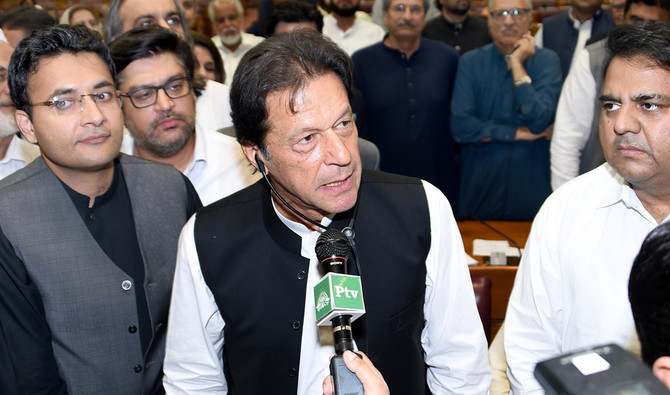ISLAMABAD: Members of Pakistan’s freshly elected national assembly voted in favor of Imran Khan to take the country’s most powerful position as its new Prime Minister crushing his opponent Shahbaz Sharif on Friday.
Khan, chief of Pakistan Tehreek-e-Insaaf (PTI) received an impressive 176 votes in the 342 seat lower house of parliament. His rival Sharif, younger brother of imprisoned ex-Premier Nawaz Sharif and president of Pakistan Muslim League – Nawaz (PML-N) received 96 votes.
The result announcement by the speaker of the house rattled lawmakers of PML-N sparking a loud protest against Khan’s victory as unacceptable repeatedly chanting “Prime Minister Nawaz Sharif” who was judicially ousted from the premiership last year and is serving time in prison on corruption charges.
Meanwhile PTI lawmakers rejoiced and congratulated Khan who remained calm amid the strong protest by his rivals which continued despite requests by the speaker Asad Qaiser for silence forcing him to temporarily suspend the assembly session.
Amid unrest, the new Prime Minister addressed the national assembly members following resumption of the session by the speaker.
------
READ MORE: EXCLUSIVE: Pakistan PM contender Imran Khan pledges stronger ties with Saudi Arabia
------
"I did not climb on any dictator's shoulders; I reached this place after struggling for 22 years. Only one leader struggled more than me, and that was my hero, Jinnah. Twice every month I will answer to the people during the question-answer session in the assembly", said Khan and vowed to bring promised change the country desires.
"We have to have strict accountability in this country; the people who looted this country, I promise that I will work against them" and “the money that was laundered, I will bring it back — the money that should have gone towards health, education, and water, went into people's pockets" Khan pledged in continuation of his anti-corruption campaign.
He briefly centered his attention towards the protesting opposition and reminded them of their failure to address his concerns when he raised his voice against election rigging during the PML-N government following 2013 general elections.
Khan told the PML-N leadership that his government would cooperate with them if they chose to take rigging allegations to court and would provide food, water, and containers if they opted to stage demonstrations against his ruling coalition.
The PTI won the July 25 election with 116 seats in the National Assembly, the lower house of Parliament.
The party took in independent candidates and formed an alliance with other political parties, putting it above the threshold required for a majority in the assembly, said PTI spokesman Fawad Chaudhry.
Candidates backed by the PTI and its coalition partners won the key positions of the speaker and deputy speaker of the house on Wednesday, dealing another blow to the 11-party opposition alliance
The Pakistan People’s Party (PPP), with 54 seats backed out of supporting Sharif’s candidacy, weakening the position of the PML-N, which has 81 seats.
In response Sharif also reminded the new premier of his earlier commitment. "You had said that if rigging in 2013 elections would be proven, Nawaz Sharif's government should resign. We will not let you run from this. We will hold you accountable for stealing votes" firmly said Sharif and continued his diatribe over systematic election rigging hurling accusations.
The first time member of the national assembly, Bilawal Bhutto, the young Chairman of PPP maintained posture and decorum during the session. He challenged Khan on his words to the nation and said, "our prime minister-elect has promised a 100-day roadmap. I want to see how he creates 10 million jobs, ends poverty" and asked the new premier “what his plan will be to deal with the economic crisis" which the new government is likely to seek a bailout package from the International Monetary Fund, a door Khan had vowed not to knock for help regardless.



























